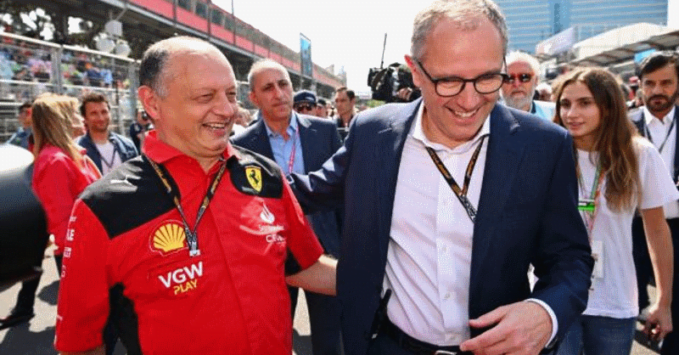Potential Leadership Shift in Formula 1: The Fate of Stefano Domenicali
A Career in Transition
Stefano Domenicali has made significant contributions to the world of motorsport, beginning his journey with Ferrari where he undertook various roles, ultimately serving as Team Principal. In 2020, he ascended to the position of president and CEO of Formula 1. Since then, this Italian executive has played an instrumental role in reshaping F1 into a completely different entity from what it was during his earlier tenure at a team. However, as his current contract dwindles towards its conclusion, questions loom over whether he will sign an extension.
Contract Uncertainty
Domenicali’s contract is set to expire soon; however, fresh reports indicate that negotiations on a renewal have not yet unfolded. Initially expected to finalize negotiations last summer, these discussions failed to materialize. As it stands now, there remains just one year left on his agreement.
According to sports.org/2024/09/24/athletics/get-ready-for-the-exciting-2024-state-level-master-athletics-meet-this-november/” title=”Get Ready for the Exciting 2024 State-Level Master Athletics Meet this November!”>insights shared by the Daily Mail, supporters of Domenicali argue that there’s nothing extraordinary about the situation—claiming he is managing this transitional phase with a steady hand and focusing on maintaining authority over his career’s trajectory. On the flip side, sources from the British publication suggest that Greg Maffei—the head honcho at Liberty Media (which holds Formula 1’s commercial rights)—is contemplating changes within F1’s leadership landscape.
Company Changes and Speculations
And fans to navigate the potential transition:
“`html
Revving Up for Change: Is a New Era Looming with Stefano Domenicali’s Departure from Formula 1
Stefano Domenicali: A Brief Overview
Stefano Domenicali has been a significant figure in Formula 1 since joining Ferrari in the late 1990s. He ascended through various roles, culminating in his appointment as Team Principal. After a successful stint, he transitioned to managing F1 as its CEO, bringing innovation and strategic direction to the sport.
The Announcement of Domenicali’s Departure
In recent weeks, news of Stefano Domenicali’s departure from Formula 1 has taken the motorsport world by storm. This unexpected shift raises numerous questions about the future direction of the sport and the management style that will take precedence in the upcoming seasons.
Impact on Formula 1 Leadership
Domenicali’s exit opens the door for new leadership dynamics. The following points highlight the potential impacts:
- New Vision: The incoming CEO may bring fresh ideas and a different approach to managing Formula 1.
- Policy Changes: Changes in regulatory policies and financial strategies may be introduced, affecting teams and sponsors.
- Collaboration with Teams: The relationship with team principals and stakeholders may evolve, influencing collaboration strategies.
- Sustainability Initiatives: A focus on sustainability may gain momentum, furthering projects started under Domenicali.
Key Considerations for the Future
| Consideration | Potential Outcomes |
|---|---|
| New Leadership Style | Shifts in motivational techniques and team engagement. |
| Financial Management | Possible changes in revenue distribution or budgeting practices. |
| Technological Innovations | Accelerated introduction of tech initiatives to enhance race performance. |
| Market Expansion | New markets and fan engagement strategies may be explored. |
Case Studies: Leadership Changes in Sports
Analyzing previous instances of leadership transitions in sports can provide valuable insights into what Formula 1 might expect:
- NBA’s Adam Silver: His promotion led to a focus on global expansion and increased player engagement.
- NASCAR’s Steve Phelps: Implemented strategies that embraced diversity and inclusion, drawing in a broader fan base.
Benefits of Embracing Change in Formula 1
While the uncertainties of a leadership change can be daunting, there are numerous benefits to be gained:
- Innovation in Strategy: Fresh perspectives often result in creative solutions to longstanding challenges.
- Revitalization of Fan Experience: Engaging new demographics and enhancing viewer engagement can rejuvenate interest and attendance.
- Increased Collaboration: New leadership may foster a more collaborative environment among teams, sponsors, and stakeholders.
- Sustainability Focus: A new approach may bring accelerated sustainability initiatives to the forefront, appealing to environmentally conscious fans.
Practical Tips for Teams and Fans
As we step into this period of change, here are some practical tips for teams
In recent events indicative of shifts within office dynamics at Formula 1, Sacha Woodward Hill stepped down from her legal director position after three decades with the organization. This has sparked speculation that Domenicali may similarly be heading toward departure as well. A confidential source relayed to Daily Mail: “The Americans are likely looking for some restructuring,” implying that Maffei seeks comprehensive command over operations—this too could prompt changes involving Domenicali.
Moreover, media outlets are already conjecturing potential successors for Domenicali should he choose not to renew his contract or if Liberty Media decides otherwise. High-profile names like Christian Horner from Red Bull Racing and Toto Wolff who leads Mercedes have emerged along with Zak Brown from McLaren as possible candidates vying for this pivotal role.
Avoiding Conflicts of Interest
While contemplating new leadership could usher in innovative strategies for Formula 1’s future directions—appointing figures deeply entrenched within team management carries inherent risks associated with conflicts of interest given their current positions as team principals or CEOs themselves. Such appointments might grant them undue influence favoring their respective squads—a scenario deemed problematic should they ascend into F1’s upper echelon.
Instead, if a transition does occur within leadership ranks at Formula 1 following Domenicali’s exit or re-negotiation mishaps—it would be prudent for decision-makers to consider individuals outside direct ties accumulated through previous affiliations with racing teams in recent years.
As discussions around potential changes brew amidst uncertainty surrounding Stefano Domenicali’s future unfold—it opens up vital conversations about what lies ahead not just for him personally but also regarding strategic reforms necessary for sustaining growth across all competitive aspects present within global motor racing today.






